Awareness Survey of 18-Year-OldsResults of 7th and 8th installments announced
The results of the seventh installment of the Awareness Survey of 18-Year-Olds, launched by The Nippon Foundation in October 2018, were announced on January 7, 2019. The theme was “Coming of Age Ceremony,” and the survey found that roughly 70% of respondents want to attend their Coming of Age Ceremony while roughly 30% do not. In addition, roughly three-fourths of respondents want the age for Coming of Age Ceremony attendance to remain at 20 (despite the age of adulthood for voting, marrying without parental consent, taking out loans, etc. having been lowered to 18), with the top reason being that having the ceremony at age 18 would interfere with their college and university entrance exam preparations.
The results of the eighth installment, on the theme of “Entering University” and announced on January 30, 2019, showed that roughly 65% of respondents are either currently enrolled or intend to enroll in a junior college or university. With regard to the government’s 10-year freeze on increases in the enrollment capacity of universities located in central Tokyo, enacted last year as part of its regional revitalization initiative, roughly 30% approve of the measure while slightly more than 40% do not. In addition, close to 40% of respondents felt that regional universities contribute to local society, and roughly the same percentage believe that universities train human resources who are able to be active in global society.
Notes:
- Local governments in Japan hold a Coming of Age Ceremony every year for residents who reach 20 years of age during the fiscal year, to mark their having attained legal adulthood. Most ceremonies are held on or near the second Tuesday in January, which is Coming of Age Day, a public holiday.
- As per standard Japanese usage, for the purposes of this survey “university” refers to undergraduate programs at four-year colleges and universities that confer a bachelor’s degree.
- In the information below, differences between total amounts and simple sums are due to rounding.
Survey 7. Coming of Age Ceremony (Results announced on January 7, 2019)
Finding: 70.6% of respondents want to attend their Coming of Age Ceremony.
- Do you want to attend your Coming of Age Day Ceremony? (n=800)
- Want to attend (70.6%)
- Do not want to attend (29.4%)
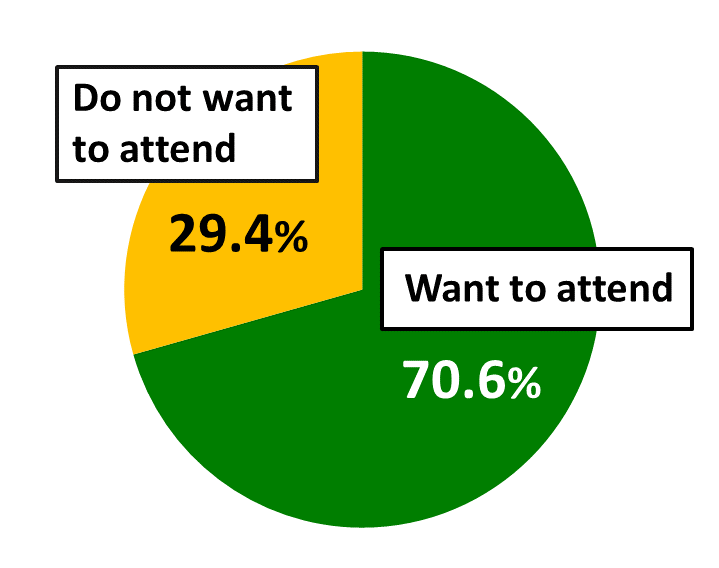
Top reasons for wanting to attend (multiple answers allowed; n=565):
- To see school classmates (66.4%)
- The ceremony marks a turning point in my life (54.3%)
- The ceremony is an opportunity to wear a colorful kimono (32.6%)
- I will feel like an adult if I attend (31.3%)
- To show my thanks for being able to attend a public event (19.3%)
- To experience the rowdy atmosphere (8.7%)
Top reasons for not wanting to attend (multiple answers allowed; n=235):
- I don’t want to see school classmates (36.2%)
- I don’t see the point of celebrating (34.0%)
- Celebrating with my family and friends is sufficient (25.5%)
- I don’t like the rowdy atmosphere (24.3%)
- I will consider myself an adult even if I don’t attend (22.6%)
- The clothing is expensive / I can’t afford it (20.9%)
Finding: Roughly three-fourths (74.0%) of respondents want the age for Coming of Age Ceremony attendance to remain at 20 (despite the age of adulthood for voting, marrying without parental consent, taking out loans, etc. having been lowered to 18).
What do you consider to be the appropriate age for attending one’s Coming of Age Ceremony? (n=800)
- Age 20 – 74.0%
- Age 18 – 23.9%
- Other – 2.1%
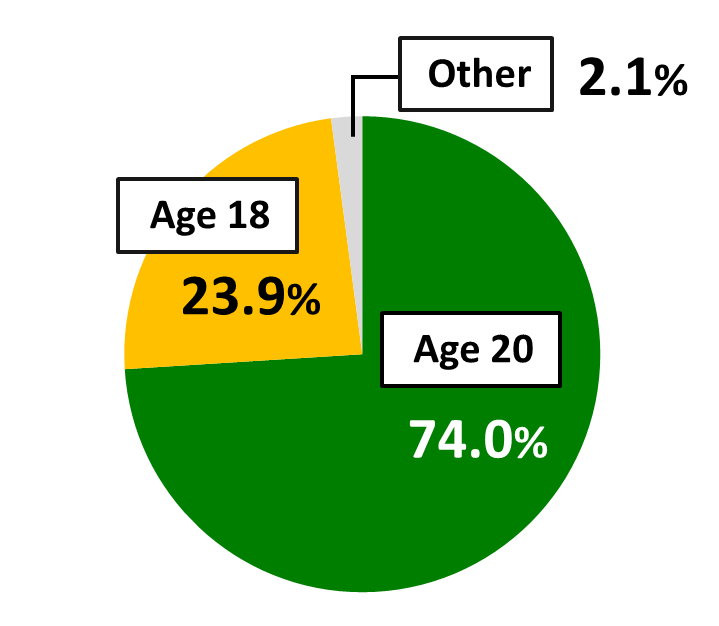
Of those respondents who want the age for Coming of Age Ceremony attendance to remain at 20 (n=592), the top reasons for doing so were:
- At age 18 it would interfere with my college and university entrance exam preparations (62.8%)
- If it becomes age 18 I won’t be able to celebrate by drinking alcohol and smoking cigarettes (38.2%)
- At age 18 I will be financially pressed as I prepare to enter college or university (33.6%)
- At age 18 I will be busy looking for a job (23.8%)
Of those respondents who want the age for Coming of Age Ceremony attendance to be lowered to 18 (n=191), the top reasons for doing so were:
- The age of adulthood has been lowered to 18 for other things (62.8%)
- If you are an adult at age 18, it would be confusing to have the ceremony at a different age (39.8%)
- I will be able to feel like an adult at age 18 (30.9%)
- At age 20 I will be busy looking for a job (4.2%)
Survey 8. Entering University (Results announced on January 30, 2019)
Finding: Top reasons given by all respondents for the value and attractiveness of a university education in general (n=800; multiple replies allowed):
- You are able to study and research what interests you (56.9%)
- To obtain a university degree on my resume (43.5%)
- You can use your free time to gain various kinds of experiences (41.3%)
- It is useful for finding employment (37.0%)
- You can make a diverse range of friends (28.8%)
- You can broaden your personal network (28.5%)
- You can study under teachers and researchers that interest you (8.8%)
- Other (1.0%)
- A university education does not have value or attraction (13.9%)
Finding: 29.4% of respondents approve of the government’s freeze on enrollment capacity at universities in central Tokyo, while 41.0% oppose the measure. (n=800)
- Approve (29.4%)
- Disapprove (41.0%)
- Other (29.6%)
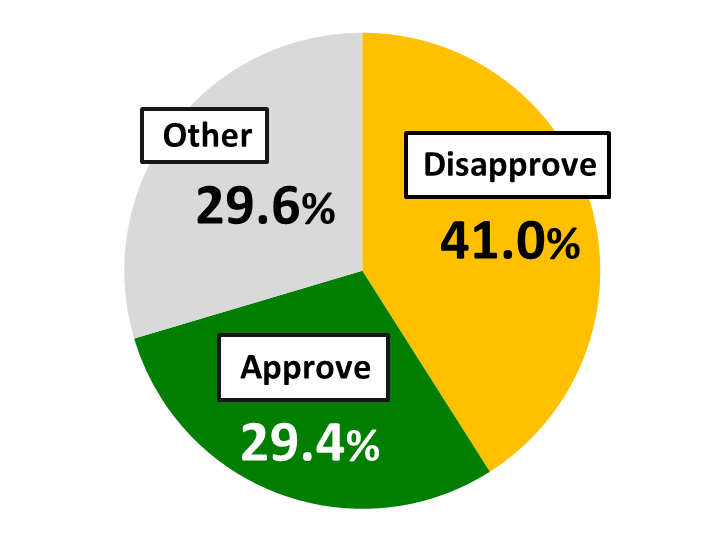
Finding: 37.4% of respondents feel that regional universities contribute to local society. (n=800)
- Do contribute (37.4%)
- Do not contribute (36.1%)
- Other (26.5%)
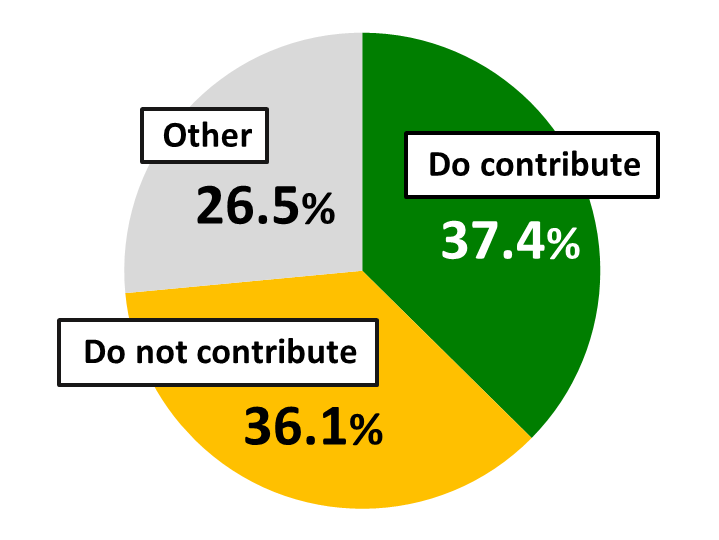
Finding: 38.0% of respondents believe that universities train human resources who are able to be active in global society. (n=800)
Do you believe universities train human resources who are able to be active in global society?
- Yes (38.0%)
- No (37.6%)
- Other (24.4%)
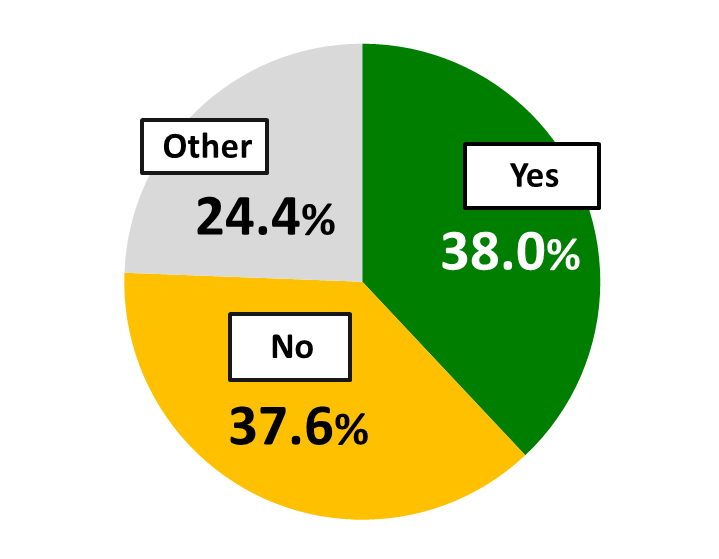
Contact
Communications Department
The Nippon Foundation
- E-mail:cc@ps.nippon-foundation.or.jp



